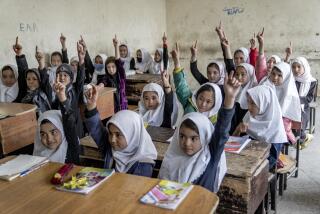Afghan Women Remain Stifled
- Share via
At the convention of the loya jirga, or grand assembly, to debate Afghanistan’s new constitution, an extraordinary thing happened. Malalai Joya, a 25-year-old female social worker from the rural province of Farah, stood up and said what no one up to now had dared say: that many of the jirga’s committee chairmen were criminals. Instead of being given influential positions, they should be tried for their crimes. The actions Joya referred to were committed by Islamic fundamentalists -- moujahedeen, or holy warriors -- from 1992 to 1996 and included widespread rocket shellings, torture, rape and mass killings of civilians.
Joya’s impassioned plea was particularly daring in Afghanistan. Although the United States and the United Nations hailed the defeat of the Taliban as a “liberation” for the Afghan people, the reality is otherwise -- especially for women. Most people are afraid to speak out against those in power for fear of physical retribution. Joya is now under the protection of the U.N. after receiving death threats.
U.S. support of fundamentalists in powerful positions throughout the country has left Afghanistan’s dreams of freedom dashed, and women far from liberated.
Earlier this year, I visited Kabul to finish shooting a documentary about Afghan women. One of the women I followed, Shapiray, had returned to Kabul from a Pakistani refugee camp, where she stayed after fleeing the Taliban in 1998.
Shapiray’s circumstances exemplify the many difficulties women still face. She teaches in a small girls school near her home, 40 miles from Kabul. Walking to and from the school, she wears the traditional burka, the head-to-toe garment. She doesn’t wear it out of religious duty, but as a protective measure; she is fearful of public humiliation and physical attack at the hands of armed Northern Alliance moujahedeen who rule her area.
The moujahedeen do not approve of women leading any part of their lives in public, and harshly intimidate those who think differently. Except for going to work, Shapiray does not leave her home. She does not go to the bazaar for groceries; this is done by her husband. Increased opportunities for education, health care and employment for women are largely restricted to Kabul, where they have some measure of independence and security due to the presence of international peacekeeping forces.
In the rest of the country, however, where U.S.-tolerated regional warlords hold power, opportunities are severely limited. The U.N. and international human rights groups recently released reports detailing widespread beatings, kidnappings and rape by these warlords and their militias. And several girls schools around the country have been set on fire.
Women’s rights are under attack even in the courts. This is largely due to President Hamid Karzai’s appointment of Fazal Hadi Shinwari as chief justice of the Supreme Court. In violation of the constitution, Shinwari is over the age limit and has training only in religious, not secular, law. He is an ally of the pro-Wahhabi, Saudi-backed fundamentalist leader Ustad Abdul Rasul Sayyaf, who is a committee chairman in the loya jirga.
Shinwari has packed the Supreme Court with sympathetic mullahs, called for Taliban-style punishments and brought back the Taliban’s dreaded Ministry for the Promotion of Virtue and Prevention of Vice, renamed the Ministry of Haj and Religious Affairs. It deploys squads to stop public displays of “un-Islamic” behavior among Afghan women.
The litany of laws passed this year to govern women’s conduct reads like a page out of the Taliban handbook. They include the banning of coeducational classes; restrictions on a woman’s ability to travel by limiting the time she can be without a mahram, a male relative or husband; and forbidding women to sing in public. The biggest blow to women’s rights was dealt in November when a 1970s law prohibiting married women from attending high school classes was upheld. This is a major step backward for women and girls because many underage girls -- some as young as 9 or 10 -- are forced into marriage and have no hope of improving their lives.
What is particularly ominous about Afghanistan’s situation is that the oppression of women is once again being given legal and religious justification by the state. It is vital that Americans speak up now against this. In his 2002 State of the Union address, President Bush said that in Afghanistan today, “women are free” -- but he was wrong.
Malalai Joya’s courageous stand must be supported and her charges against the fundamentalist leaders investigated. The U.S. should stop its support of fundamentalists and demand that women’s rights be explicitly protected under Afghanistan’s new constitution.
Meena Nanji is a filmmaker based in Los Angeles and New Delhi.
More to Read
Sign up for Essential California
The most important California stories and recommendations in your inbox every morning.
You may occasionally receive promotional content from the Los Angeles Times.













